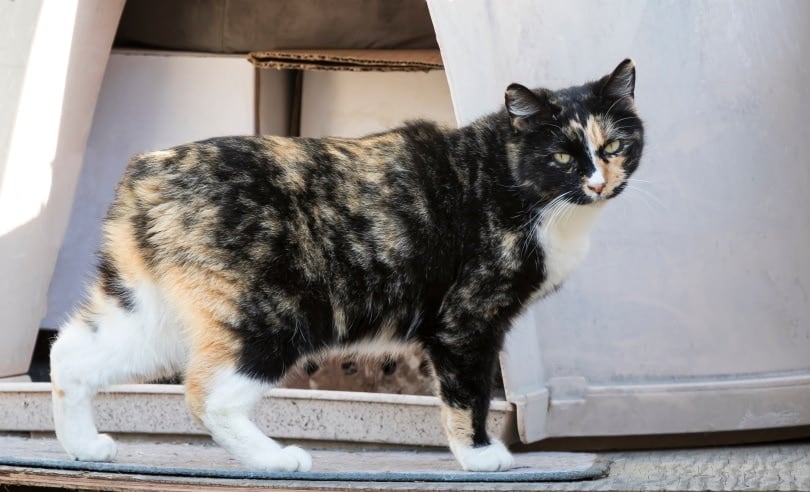Manx cats are a very unique breed and are recognized for their round shape and lack of a tail due to a genetic mutation. They are medium-sized cats that are lively and playful companions. While not every Manx is completely tailless, most have a stump for a tail but can be born with full tails or partial ones.
Manx have short hair with a double coat that comes in several colors. They are known for their excellent temperament and get along very well with children, dogs, and other cats. While the cats are not considered rare, they are not as common as other breeds of cats.
History
Manx cats originated hundreds of years ago on the Isle of Man on the Irish Sea. They descended from the African wildcat (Felis lybica), and their taillessness results from a genetic mutation.

Attributes
There are several types of tails that the Manx can have, including:
- Rumpy: Tailless
- Rumpy Riser: A slight rise where the tailbone meets the body
- Stumpy: Partial tail
- Longy: Nearly full-length tail
The “rumpy” gene is dominant, but it is possible for a litter of Manx cats to have all four types of tails. Some Manx are long-haired, but they are less popular than the short-haired variety. Long and short-haired offspring can come from the same litter.
Intelligence
The Manx is well-known for its intelligence and can easily be trained or taught tricks. However, their intelligence can also get them into amusing situations, including opening doors, getting into cupboards, and turning on faucets. They are very skilled at catching mice and, as a result, have been a popular choice for farmers. They enjoy playing games that require mental stimulation and daily exercise.
Environment
Manx cats are ideally cold-weather cats. They are fond of water since they originated from an island, which is rare for cats.
Lifespan
The cats can live over 15 years if they are in good health. They originally hunted on farms and ships and can weigh up to 12 pounds.

Common Health Issues
Like any other cat, the Manx has health issues that should be researched before taking one into your home:
- Urinary tract issues
- Diabetes
- Constipation
- Asthma
- Fatty liver syndrome
- “Manx Syndrome”: a condition that results when the lack of tail shortens the spine
Due to the lack of tail, it is crucial to be mindful when picking up your Manx since their nerve endings are exposed.
Conclusion
The Manx cat is a lovely feline that is affectionate with people and can be an excellent addition to your household. They get along with small children and other pets and are playful yet functional and intelligent. Their health conditions should be taken into consideration, but most Manx cats are quite healthy.
Featured Image Credit: Shutterstock
















